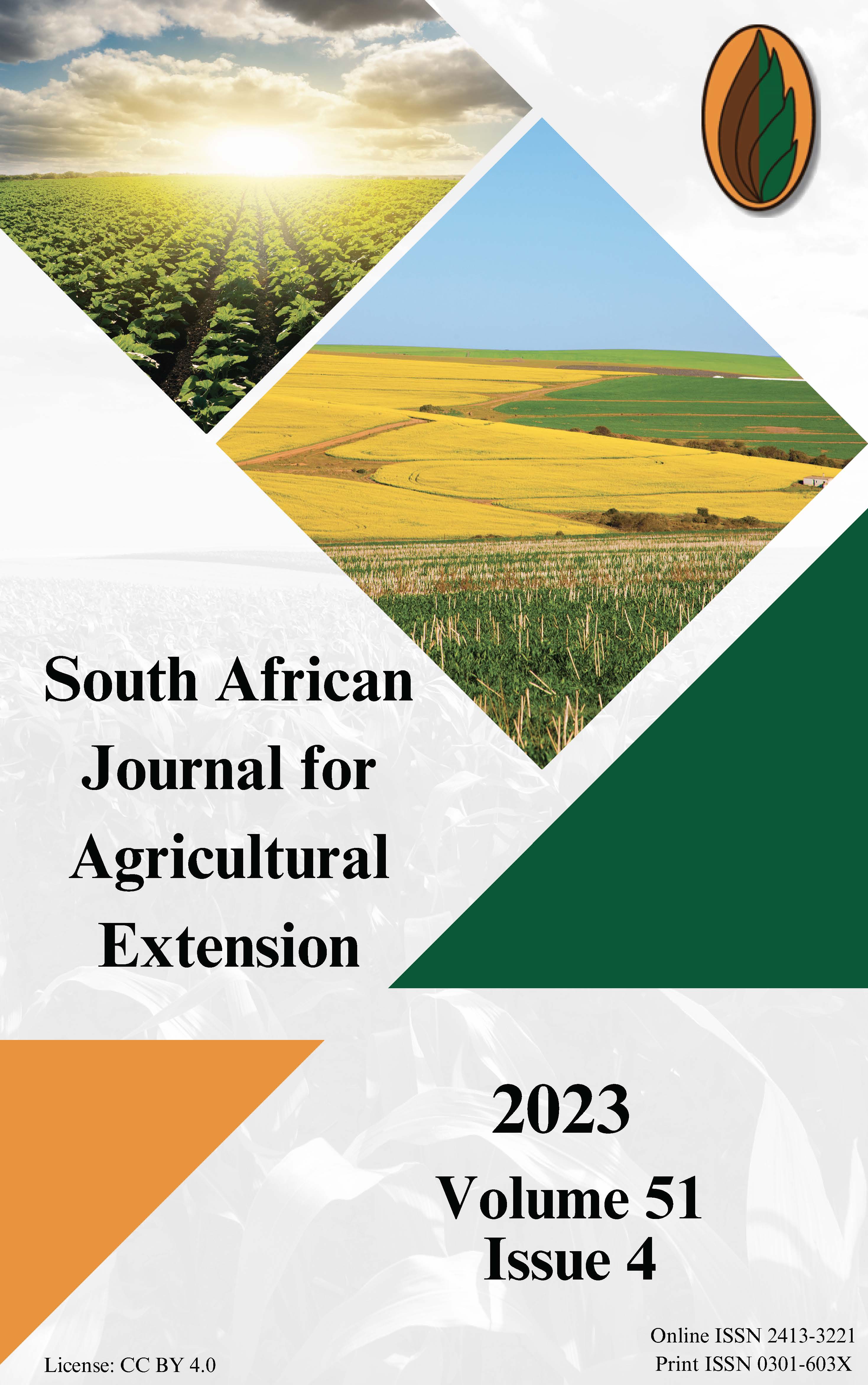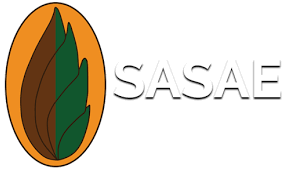Strategies for Climate-Change Resilience Among Maize Farmers in Lesotho
DOI:
https://doi.org/10.17159/2413-3221/2023/v51n4a12225Keywords:
Food Security, Climate-Smart Agriculture, Likoti, MachobaneAbstract
Maize is a staple crop in Lesotho; hence, it can be vital in improving food security and strengthening the economy. However, climate change necessitates the adoption of sustainable agricultural practices in the growing of maize. It is assumed that small-scale maize farmers lack awareness of climate change and mitigation strategies. This hypothesis has not yet been assessed in Lesotho, especially in the study area; hence, this study is conducted to evaluate it. One hundred small-scale maize farmers from Mafeteng and Mohale’s Hoek Districts were selected to participate in the study. The data was collected using a structured questionnaire. The results show that small-scale maize farming in Mafeteng and Mohale’s Hoek is dominated by older women (54%) who are within the age group 56 to 65 years (32%) with a low level of formal education (33%). 70% of farmers have been in farming for more than 20 years. Most (70%) of farmers indicated that their maize production is negatively affected by climate change, and 51.7% of farmers experienced poor yield, maize quality, and rainfall. This has led to food insecurity (44%). Therefore, 89% of farmers want to increase fertiliser use to maximise production and improve food security. 37% of farmers desire to switch to CSA, and the majority (83%) intend to adopt CA systems to mitigate climate change. Further studies are recommended to identify LikotiLikoti’s system’s ability to boost agricultural yields and increase food production, combat soil erosion, and enhance fertility and to assess if Machobane system - Mantsa Tlala, or “expeller of hunger leads to a rise in per capita food production and overall land productivity.
Downloads
References
AFRICA.ORG., 2014. Eight ways climate change is already affecting Africa. We fight climate change. Available from http://350africa.org/8-ways-climate-change-is-already-affecting-africa/
ALLIANCE FOR FOOD SOVEREIGNTY IN AFRICA [AFSA]., 2016. The Machobane farming system in Lesotho. Available from https://afsafrica.org/wp-content/uploads/2019/04/Machobane_farming_system_lesotho.pdf
BING.COM/MAPS., 2023. Maps of Lesotho. Available from https://www.bing.com/search?q=map+of+combine+mafeteng+and+mohale%27s+hoek+in+lesotho&qs=
BUREAU OF STATISTICS., 2018. 2017/2018 availability and utilization of cereals report. Maseru: Bureau of Statistics.
BUREAU OF STATISTICS., 2014. Lesotho Census report 2013/14. Maseru: Bureau of Statistics.
CAIRNS, J.E., CHAMBERLIN, J., RUTSAERT, P., VOSS, R.C., NDHLELA, T. & MAGOROKOSHO, C., 2021. Challenges for sustainable maize production of smallholder farmers in sub-Saharan Africa. J. Cereal Sci., 101: 103274. DOI: https://doi.org/10.1016/j.jcs.2021.103274
DICKIE, A., STRECK, C., ROE, S., ZUREK, M., HAUPT, F. & DOLGINOW, A., 2014. Strategies for mitigating climate change in agriculture: Abridged Report. Climate Focus and California Environmental Associates.
FOOD AND AGRICULTURAL ORGANIZATION [FAO]., 2006. Assessment of 2005/06 Agricultural Production in Lesotho. Support to the agricultural season assessment, Maseru, Lesotho.
FOOD AND AGRICULTURAL ORGANIZATION [FAO]., 2013. Mixed picture for Lesotho’s food security. Available from https://reliefweb.int/report/lesotho/mixed-picture-lesothos-food-security
GILILI, C., 2021. Climate crisis threatens future maize production in SA and Lesotho. Mail & Guardian. Available from https://mg.co.za/environment/2021-03-26-climate-crisis-threatens-future-maize-production-in-sa-and-lesotho/
GOLDBLATT, A., 2012. Agriculture: Facts and trends, South Africa. Available from http://www.foresightfordevelopment.org/sobipro/54/908-agriculture-facts-and-trends-south-africa
HUNTER, J.P., 1987. The economics of wool and mohair production and marketing in Lesotho. Roma: Institute of Southern African Studies.
INTERNATIONAL FUND FOR AGRICULTURAL DEVELOPMENT [IFAD]., 2020. Kingdom of Lesotho. Country strategy note, Main Report 2019/2020. IFAD.
INTERNATIONAL FUND FOR AGRICULTURAL DEVELOPMENT [IFAD]., 2019. Kingdom of Lesotho. Country Strategic Opportunities Programme 2020 – 2025. IFAD.
LEDUKA, R., CRUSH, J., FRAYNE, B., MCCORDIC, C., MATOBO, T., MAKOA, T., MPHALE, M. & PHAILA, M., 2015. The state of poverty and food insecurity in Maseru, Lesotho. AFSUN Food Security Series.
LESOTHO VULNERABILITY ASSESSMENT COMMITTEE [LVAC]., 2016. Market assessment report. Maseru: WFP.
LESOTHO VULNERABILITY ASSESSMENT COMMITTEE [LVAC]., 2017. Lesotho annual vulnerability assessment and analysis report. Maseru: WFP.
LESOTHO VULNERABILITY ASSESSMENT COMMITTEE [LVAC]., 2019. Lesotho annual vulnerability assessment and analysis report. Maseru: WFP.
LYMBERY, P., 2017. Farmageddon in pictures. The true cost of cheap meat. Bedford Square, London.
MASEATILE, M.S.M., 2016. Productivity of small-scale maize farmers in Lesotho. Master’s dissertation, University of Free State, Bloemfontein.
MAZUREK, B., 2018. Ten ways farmers can fight climate change. Cultivating a healthy food system. San Franciso: CUESSA.
MINISTRY OF ENERGY, METEOROLOGY AND WATER AFFAIRS [MEMWA]., 2013. Second National Communication of Lesotho to the UNFCC. Available from http://unfcc.int/resource/docs/napa/1soo2.pdf.
MOELETSI, M.E. & WALKER, S., 2013. Agroclimatological suitability mapping for dryland maize production in Lesotho. Theor. Appl. Climatol., 114(1-2). DOI: https://doi.org/10.1007/s00704-012-0829-1
MOROJELE, M.E. & SEKOLI, M.S., 2016. Trend analysis of maize production in Lesotho and its distribution among the ecological zones. EJAFR., 4: 1-7.
OLADELE, O.I., 2011. Contribution of indigenous vegetables and fruits to poverty alleviation in Oyo State, Nigeria. J Hum Ecol., 34(1): 1-6. DOI: https://doi.org/10.1080/09709274.2011.11906362
OLALEYE, O.A., TAMBI, E., BANGALI, S. & ODULARU, G.O.A., 2016. Likoti farming under changing climate in Lesotho: Agronomic Grain Yield versus Technical Efficiency. Journal of Ecograph., S5: 001.
RAIDIMI, E.N. & KABITI, H.M., 2019. A review of the role of agricultural extension and training in achieving sustainable food security: A case of South Africa. S Afr. Jnl. Agric. Ext., 47(3). DOI: https://doi.org/10.17159/2413-3221/2019/v47n3a520
RANTŠO, T.A. & SEBOKA, M., 2019. Agriculture and food security in Lesotho: Government sponsored block farming programme in the Berea, Leribe and Maseru Districts, Lesotho. Cogent Food & Agriculture., 5: 1657300. DOI: https://doi.org/10.1080/23311932.2019.1657300
SILICI, L., NDABE, P., FRIEDRICH, T. & KASSAM, A., 2011. Harnessing sustainability, resilience and productivity through conservation agriculture: The case of Likoti in Lesotho. Int. J. Agri. Sust., 9(1): 1-8. DOI: https://doi.org/10.3763/ijas.2010.0555
THIERFELDER, C., CHIVENGA, P. & MUPANGWA, W., 2017. How climate-smart is conservation agriculture (CA)?-its potential to deliver on adaptation, mitigation and productivity on smallholder farms in Southern Africa. Food Sec., 9: 537-560. DOI: https://doi.org/10.1007/s12571-017-0665-3
UNITED NATIONS [UN]., n.d. Climate Action. Available from https://www.un.org/en/climatechange
WORLD BANK GROUP., 2021. Climate risk country profile: Lesotho. Available from https://reliefweb.int/report/lesotho/climate-risk-country-profile-lesotho
Downloads
Published
Issue
Section
License
Copyright (c) 2023 Z.D. Bengeza, T.D. Manenzhe, M.E. Zwane

This work is licensed under a Creative Commons Attribution 4.0 International License.








.png)